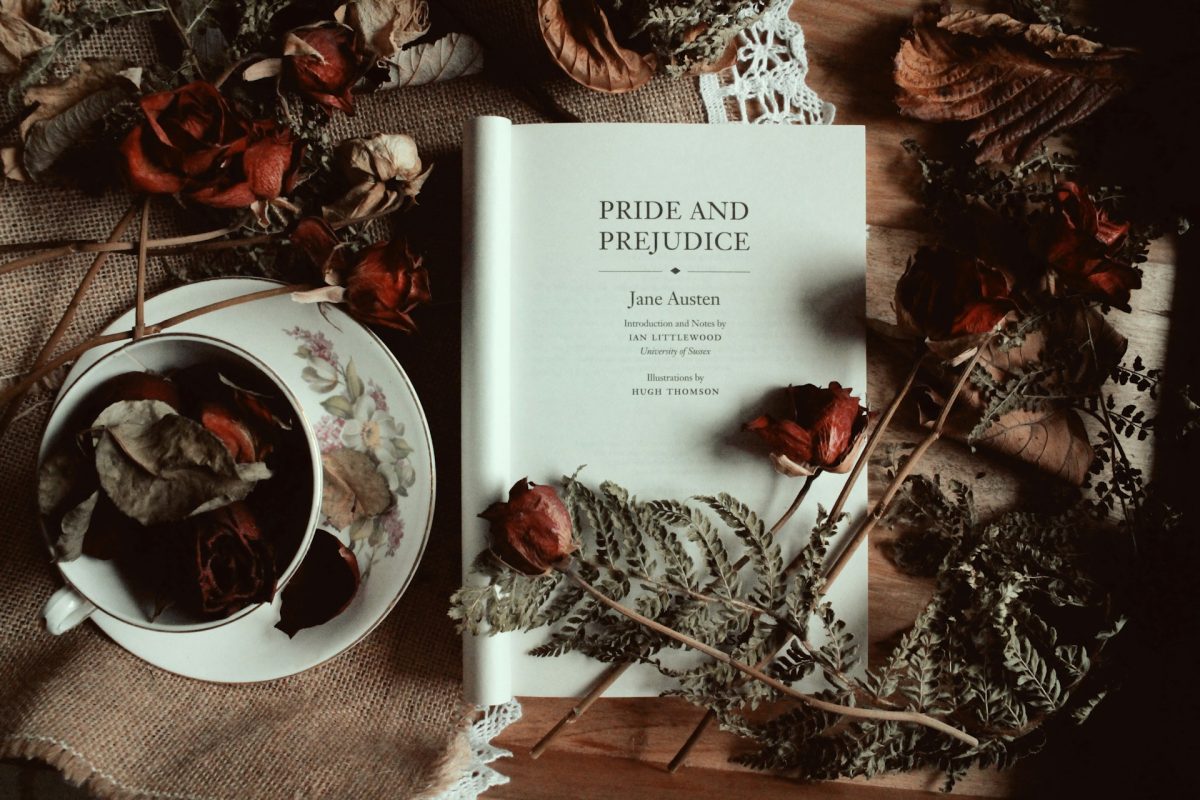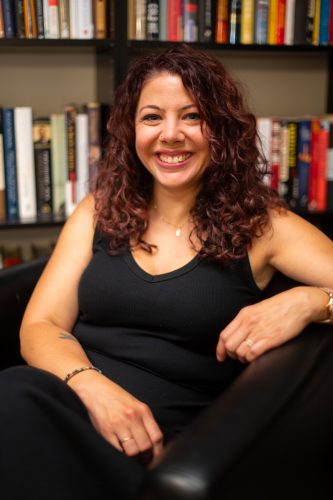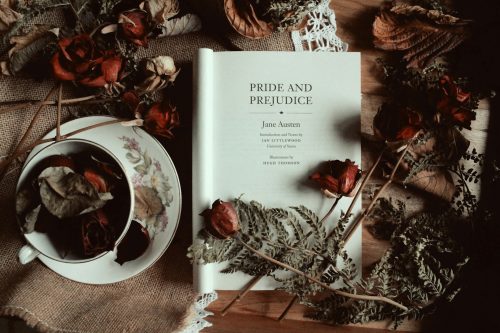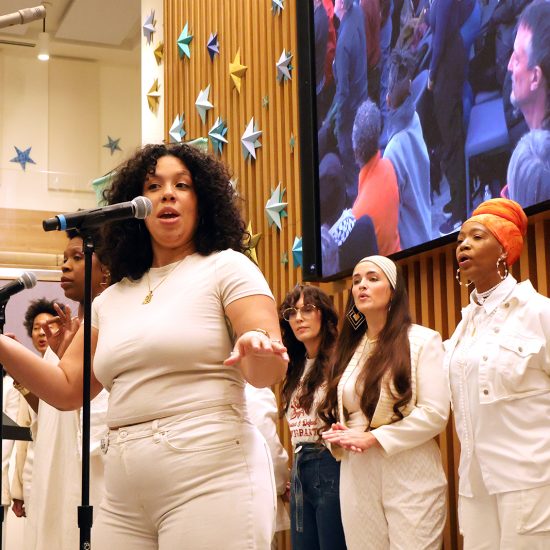
It is a truth universally acknowledged — or at least, it should be — that the 1995 BBC version of Pride and Prejudice is the best screen adaptation of Jane Austen’s novel. But when you don’t have six hours available to get your Liz-and-Darcy fix, Joe Wright’s 2005 film can get it done in just a little over two hours. Though the shorter film lacks Colin Firth emerging from a lake or rising dramatically at Wickham and Lydia’s wedding, it does feature Matthew McFadyen proposing once in the rain and then once at dawn in a field. Thankfully, Wright’s Pride & Prejudice is back in theaters in honor of its 20th anniversary (though you can also watch it on Netflix).

Juliet Vedral
Since Pride & Prejudice is the ur-text of the enemies-to-lovers story, it seems fitting that the film’s re-release coincided with the 8th annual National Week of Conversation (NWoC). The NWoC, backed by the Listen First Project, kicked off on Monday, April 21, and features resources to help people engage in depolarization and bridge-building as well as opportunities for conversations with people who are different from you. There is also the Better Together Film Festival (BTFF), where participants have their choice of six films, including one feature film, Elephant in the Room, a fun take on romance in a time of polarization. While it would have spoiled 59 wonderful chapters of insightful prose and delightful drama, fans of the couple must admit that Elizabeth Bennet and Fitzwilliam Darcy would have benefited from a healthy, frank conversation earlier in their relationship.
For those of you who are just now popping up from the rock you’ve been living under, Pride & Prejudice is both a love story and a social commentary. Mr. and Mrs. Bennet, having no sons to inherit their family estate due to its entailment away from the female line, must find rich husbands for their five daughters. Otherwise, when Mr. Bennet dies, a socially awkward distant cousin will inherit their entire household and Mrs. Bennet and the remaining daughters will be impoverished. Mrs. Bennet hopes to marry off her eldest daughter, Jane, to their new neighbor, the young, rich, and unfortunately impressionable Mr. Bingley. Bingley’s best friend Mr. Darcy, who is the original “tall, dark, and handsome” prototype, is even more ridiculously wealthy. At a public dance, Bingley and Jane hit it off, while Elizabeth, the second-oldest Bennet sister and the novel’s protagonist, overhears Darcy disparaging her looks and refusing to dance with her. She immediately makes up her mind that Darcy is judgmental and unpleasant and the “last man in the world [she] could ever be prevailed upon to marry.”
However, Darcy quickly realizes that Elizabeth is actually a babe (or rather “one of the handsomest women in [his] acquaintance”) and also incredibly smart and witty, and starts falling for her. Elizabeth refuses to change her initial impression of Darcy, even though he keeps awkwardly attempting to join her conversations, asks her to dance multiple times, and stares intensely at her during every interaction. She just thinks he hates her and is looking to find fault with her. To be fair to Elizabeth, Darcy knows Elizabeth is a catch, but won’t make a move because her family is nuts, she has no dowry, and — gasp — some of her relatives have jobs.

Photo by Elaine Howlin on Unsplash
Here’s where some training in bridge-building might have come in handy. Instead of withholding judgment and engaging Darcy with curiosity, Elizabeth writes him off. She also withholds judgment of, and lets herself believe, George Wickham’s slander about Darcy. Elizabeth doesn’t ask Darcy for his side of the story. Instead, Elizabeth verbally attacks him during their dance at the Netherfield ball.
Darcy also makes snap judgments. Instead of encouraging Bingley to have a free and frank conversation with Jane about their relationship, Darcy encourages Bingley to break up with her. He doesn’t think Jane’s into Bingley, based on nothing but Darcy’s observation of her shyness and reserve.
Darcy is also very famously terrible at communication. His proposal to Elizabeth at Hunsford Parish is arrogant and full of insults and judgments on her and her family (I mean, who wants to be told that their family is trash during a marriage proposal). When confronted, Darcy is defensive. However, this honest conversation leads to Darcy writing a letter explaining himself to Elizabeth, which starts to make her realize that she’s been looking at him all wrong.
When Elizabeth and Darcy meet-cute again at Pemberley, Darcy starts building the bridge to Elizabeth. He is kind to Elizabeth and her aunt and uncle, engaging them charitably and with curiosity. Darcy takes time to try and understand Elizabeth, while also giving her opportunities to further change her opinion of him. Darcy helps Bingley reconcile with Jane and takes the final step to repair their broken relationship by generously providing for his enemy, Wickham and Lydia’s wedding to redeem the Bennet family from scandal and shame.
There’s a reason that Jesus calls peacemakers “blessed” and says that they “will be called sons of God.” God has every reason to judge us and shun us for all the dumb, hurtful, and cruel things we say and do. God knows he is better than us in every way. But through Christ’s humiliation, death, and resurrection, God reconciled the world to himself, not counting our sins against us. He was the ultimate Darcy, leaving the riches and joy of heaven to pay the ultimate price to redeem us. When we make peace and build bridges and show generosity to our enemies, we are acting like the true children of God and heirs of his eternal kingdom (which will never be entailed away!).
We all have friends and family in our lives with whom we fundamentally disagree. Take the opportunity this week to practice engaging them with empathy and curiosity. You don’t have to wait for an awkward proposal or a chance meeting with them at their beautiful estate to make peace.
Juliet Vedral is a writer, child-wrangler, and amateur shoe collector, as well as a senior associate at The Clapham Group. Her writing has also appeared in Sojourners. A native New Yorker, Juliet currently resides in Arlington, VA, which is still a weird thing for her to say.





